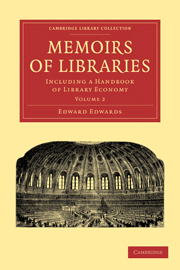Book contents
- Frontmatter
- Contents
- Chapter XV The Older Libraries of English Towns, and Their Management By Munic
- Chapter XVI The Parochial and Quasi-Parochial Libraries of England
- Chapter XVII The History of The “Public Libraries Acts” of 1850 and 1855
- Chapter XVIII The Working of The Public Libraries Acts of 1850 and 1855
- Appendix to Volume I
- Part The First. History of Libraries (Continued.)
- Book IV. The Libraries of The United States of America
- Book V. The Modern Libraries of Continental Europe
Chapter XIX - The Libraries of The Faculty of Advocates, and of The Writers to The Signet, at Edinburgh
Published online by Cambridge University Press: 29 August 2010
- Frontmatter
- Contents
- Chapter XV The Older Libraries of English Towns, and Their Management By Munic
- Chapter XVI The Parochial and Quasi-Parochial Libraries of England
- Chapter XVII The History of The “Public Libraries Acts” of 1850 and 1855
- Chapter XVIII The Working of The Public Libraries Acts of 1850 and 1855
- Appendix to Volume I
- Part The First. History of Libraries (Continued.)
- Book IV. The Libraries of The United States of America
- Book V. The Modern Libraries of Continental Europe
Summary
The Legal Profession in Scotland has every recommendation to a person resolved or compelled to remain in this country . . . . It is The highest Profession that The country knows; its emoluments, and prizes are not inadequate to The wants and habits of The upper classes; it has always been adorned by men of ability and learning. .... Its higher practice has always been combined with literature, which, indeed, is The hereditary fashion of The Profession. Its cultivation is encouraged by The best and most accessible Library in this country, which belongs to The Bar.
COCKBURN, Life of Jeffrey,i, 84, 85.The Library of The FACULTY of ADVOCATES dates from The year 1680. Its chief founder was Sir George Mackenzie of Rosehaugh, an eminent jurist, an accomplished scholar, and, to The end of his days, so thorough a student, that when The changes of The Revolution led him to abandon public life, he betook himself to Oxford, that he might enjoy at leisure The stores of The Bodleian.
The first scheme for The Advocates Library was restricted within professional limits. Many law-books were given, and sums for purchases were from time to time granted by votes of The Faculty. But, for a long period, The fund thus accruing was merely occasional, and of indefinite amount. In 1700, The collection narrowly escaped destruction by fire. It was Then removed to The ground-floor of The Parliament House. By The Act of The 8th of Queen Anne, The privilege of receiving a copy of every book entered at Stationer’s Hall, was conferred upon it. Even before this enactment it had become more general in its character than had been originally contemplated. Valuable books, in other classes than Law, were both presented and purchased. To The collection of The materials and documents of Scottish history, special attention had been wisely given, almost, from The beginning. Thus, Sir James Balfour’s collection was purchased in 1698; that of Sir Robert Sibbald, (only a part of which is his historical,) in 1723; that of The eminent historian, Dr. Robert Wodrow,—more important than eiTher of The preceding Wodrow,—more important than eiTher of The preceding—was acquired shortly after his death, in 1734.
- Type
- Chapter
- Information
- Memoirs of LibrariesIncluding a Handbook of Library Economy, pp. 3 - 15Publisher: Cambridge University PressPrint publication year: 2010First published in: 1859



